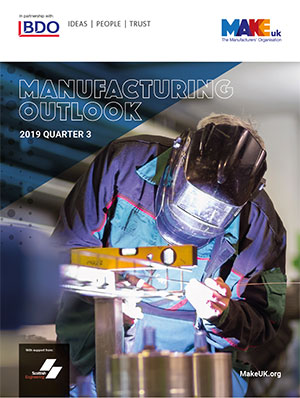Perfect storm of factors points to harsh outlook ahead as firms less prepared for ‘no deal’ than in March.

Britain’s manufacturers are firmly in a nosedive as the perfect storm of Brexit uncertainty, slowdown in major markets and trade wars takes its toll according to a major survey published today by Make UK, The Manufacturers’ Organisation and business advisory firm BDO LLP.
The Q3 Manufacturing Outlook survey comes on the back of the latest PMI data earlier this week and shows all indicators have weakened significantly, with investment and domestic orders in particular turning negative.
The survey also shows that a weaker currency is providing no solace, contrary to claims from some politicians and commentators, with export orders down despite prices falling. This indicates foreign customers are not buying British goods even though they are 6% cheaper than this time last year.
Key findings:
• All survey indicators weaken significantly
• Domestic orders turn negative
• Export orders down despite prices falling, showing cheaper pound is no benefit
• No evidence stockpiling has begun in Q3 ahead of ‘no deal’
• Investment intentions turn negative for the first time since the EU referendum
• Decline in recruitment continues
• Manufacturing forecast cut to just 0.1% in 2019, 0.2% in 2020
Commenting, Seamus Nevin, Chief Economist at Make UK, said: “Industry is facing a perfect storm of factors, compounded by a hard Brexit which could not be coming at a worse possible time. In normal circumstances a global slowdown on its own would be enough, but add trade wars and the biggest shock to our economy since the War and there seems little doubt that, barring a remarkable turnaround, the sector may be heading for recession.”
Tom Lawton, Head of Manufacturing at BDO, said: “Global competition, skills shortages, lack of a coherent industrial strategy from government and continuing technological disruption has made UK manufacturing a challenging sector for decades. The long shadow cast by the possibilities of a no deal Brexit and the uncertainty of recent months has only added to the difficulties for the sector.
“A cliff-edge decision on a deal or no-deal Brexit will mean a double whammy of continuing weaker demand for products and fundamental disruption to supply chains. The impact on supply chains will be particularly felt in the UK automotive sector where car parts are sourced from different European countries and delivered on a just in time basis before being finally assembled in the UK.
“Already suffering from a fall in output for 14 successive months, car assembly – the jewel in the crown of UK manufacturing – would be particularly hit hard by a no-deal Brexit. The Government must strain every sinew to reach a Brexit deal that protects UK manufacturing.”
According to the survey, the total order balance, whilst still just in positive territory, fell to +2% in Q3 (down from +8% in Q2 and +16% in Q1) indicating the significant rate of weakening which has taken place since the start of the year. At current trend, according to Make UK this will almost certainly turn negative in the final quarter of the year barring a remarkable turnaround in the economy.
Output also fell significantly, down to +4% from +17% in Q2, indicating there is little, if any, evidence that stockpiling is building. This is leaving companies far less prepared for ‘no deal’ than they were earlier this year.
After two quarters where they were below domestic orders, export orders (+6%) have returned to a level above domestic orders which have turned negative at -6%. Such significant weakening cannot be explained by the poorer global outlook alone, especially as UK and export prices are down by 8% and 6% respectively since this time last year.
With this harsh outlook it is not surprising that both investment and recruitment intentions have also weakened significantly. Recruitment has continued the decline witnessed for the last four quarters (six if we discount the annual increase that came in the Q4 Christmas season last year).
Furthermore, investment intentions, which have been paralysed for the last year, have now entered negative territory for the first time since Q3 2016 (the immediate aftermath of the Brexit referendum).
Unsurprisingly, therefore, both firm level and UK economy level confidence have fallen significantly this quarter with the level of confidence in the overall economy down by almost a half versus the last quarter.
As a result of this weakening picture, Make UK is now forecasting manufacturing growth of just 0.1% in 2019 (down from 0.2%) and an anaemic 0.6% in 2020 (down from 0.8%). GDP is forecast at 1.1% in 2019 and 1.4% in 2020. (All these forecasts are based on avoiding ‘no deal’)
The survey of 292 companies ran from 31 July to 21 August.

